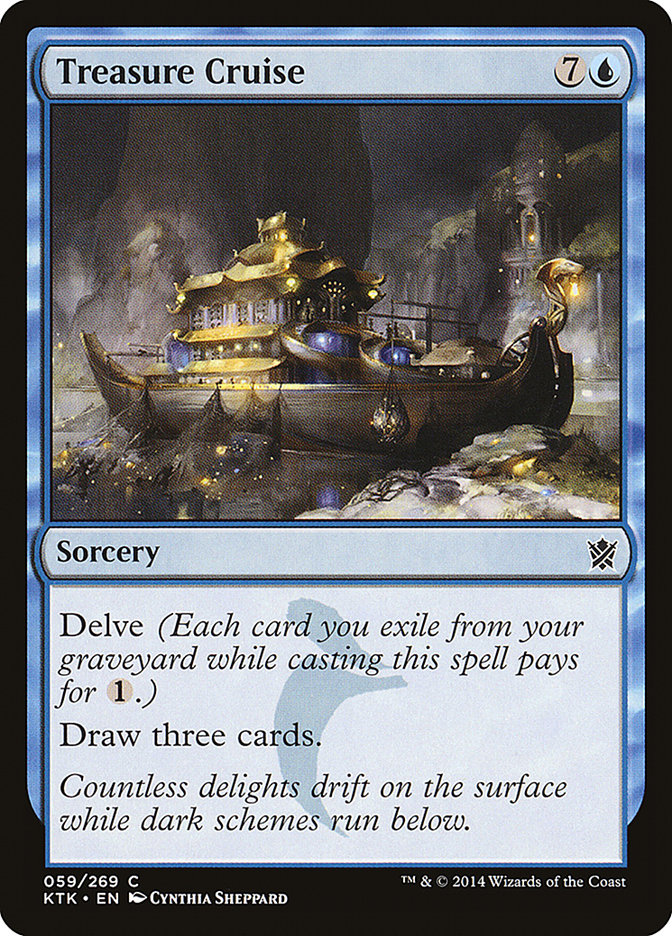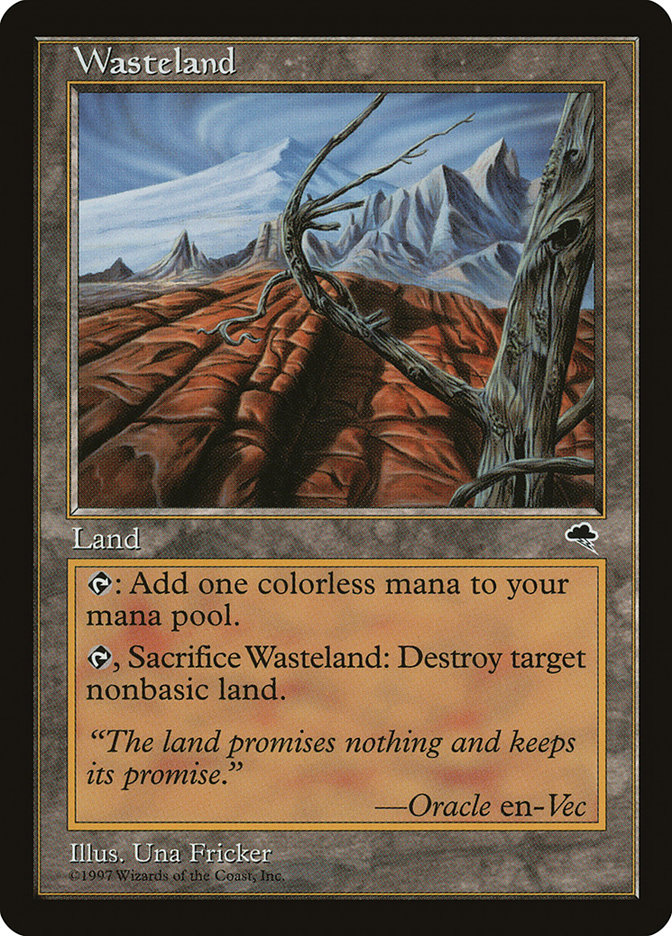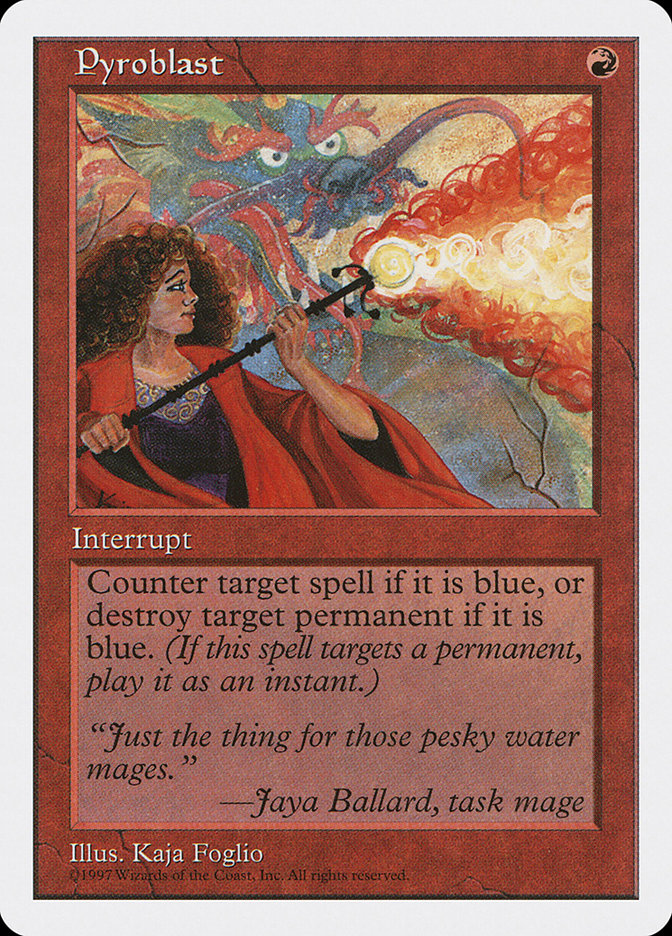You won’t see me at many Grand Prix. I can’t effectively use the pro points, I can’t play in the next couple Pro Tours (because of my stint at Wizards of
the Coast), and to me, it’s not always worth the price of the plane ticket. That said, I will not miss Grand Prix New Jersey. The event is going to be
huge, the swag is insane, and Legacy is a ton of fun.
On top of it all, I get to draw three cards for one mana.
Thoughts On Treasure Cruise
I’m not sure if Treasure Cruise will be banned in Legacy. It makes the blue decks better in a vacuum, which is not necessarily something they needed, but
as Patrick Sullivan has pointed out multiple times on SCGLive, existing blue decks need to cut something in order fit in Treasure Cruise. Sure, having a
midgame Ancestral Recall is powerful, but if you had to cut some Dazes and Spell Pierces to fit those in, you are automatically weaker against other decks.
Additionally, it makes blue decks more vulnerable to things like Spirit of the Labyrinth and Notion Thief. Because of those reasons, I don’t feel like
Treasure Cruise is completely egregious. For the most part, Magic is self-correcting, especially in a format like Legacy — If your deck is looking for a
certain type of effect, it probably exists. Despite that, it wouldn’t surprise me if Treasure Cruise got a ban at some point because once blue decks figure
out a solid balance, things might get a little unfair.
If Treasure Cruise did get banned, I’d be very sad that I never got to play the format while it was legal. I’d be missing out on a piece of history.
What Am I Playing At Grand Prix New Jersey?
While I’ve been brewing other things (and will write about those at some point), I want to cast Treasure Cruise. When I started exploring my options, I
started with U/R Delver since I assumed it was the best level one strategy. It really surprised me that the U/R Delver deck ended up being less flimsy than
I imagined, capable of slogging through a lot of hate. Rather than moving on from what I thought was the level one Treasure Cruise deck, I ended up
sticking with it.
There are plenty of rumblings that a delve control deck might dominate U/R Delver, but I don’t buy into that. I’m playing with four Monastery Swiftspear.
What Makes U/R Delver Good?
When trying to understand Delver’s place in the format, it’s important to note what has changed with the printing of Treasure Cruise. While a lot of decks
just jam Treasure Cruise into their already existing list, you have to realize that it’s not that simple. The fact that Treasure Cruise exists changes the
fundamental dynamics of nearly every matchup, both because of its existence and what cards it replaced.
In Legacy, someone is typically very ahead by turn 4. It’s a rarity that you look at a gamestate and you can’t tell who has the advantage. Now, even the
player who is behind can peel three cards for one mana. This means the game is nearly always in question. Everyone is only a Treasure Cruise away from
being right back in the game.
So what’s the best way to win the Treasure Cruise mirror? Being more mana efficient than the other player is a start. Being proactive is the other best
way. Overall, I think both are important, and U/R Delver does both of those particularly well. It’s very telling that U/R Delver can play the control game
better against U/W Miracles than Miracles can against Delver. The U/R deck even puts Miracles on a clock simultaneously!
The other thing that has changed dramatically is that you no longer have to use Force of Will judiciously. Josh Cho was watching me play a game of U/R
Delver against U/W Miracles where I Force of Willed a pair of Swords to Plowshares early, effectively eating up all my resources. A few turns later, I had
more cards than my opponent and he was low on life. He thought I was crazy and a few months ago, he would have been right, but Treasure Cruise changes
everything.
Now, instead of boarding out Force of Will in many matchups, it’s a card I rarely touch when sideboarding. If lowering your curve to mostly one casting
cost spells is the way to win blue mirrors, then zero casting cost spells become even better, no matter what the additional cost is.
Since who is winning the game is always in question, the aggressor always has the advantage.
Control Through Aggression
I touched on this in an old article, but it bears
repeating, especially after all the talk of the deck that won the Legacy Open last weekend. If we are agreeing that we want our blue deck to have removal,
cantrips, and delve cards, I want to be the guy putting pressure on my opponent.
Imagine this:
You’ve both cast some cantrips, sculpted your hand, traded one-for-one for a bit, and now it’s turn 4. You’re both at the stage in which you’re attempting
to resolve a Treasure Cruise or Dig Through Time to start pulling ahead.
In that scenario, I want to be the guy who played Delver of Secrets on turn 1 and started attacking every turn.
By putting pressure on them, you are forcing them to react and ultimately dictating the pace of the game. With cheap threats like Delver of Secrets and
Monastery Swiftspear, you really don’t have to dedicate much mana, and in return, they have to play on your terms.
If you’re trading resources while also putting pressure on them, they might stabilize eventually, but they’ll be so low that a couple of Lightning Bolts
could finish them off. Since they’re a control deck, they have to play a few extra lands, and that will eventually catch up with them also. Their Treasure
Cruises are likely to find them more air, whether it’s soft counters, reactive cards, or more lands. Meanwhile, U/R Delver’s cards are almost always live
and the deck has very few lands.
They might sideboard in more removal spells, but surely you saw that coming and have a way to sidestep that. My Sulfuric Vortexes and Price of Progresses
do a good job of ensuring my creatures don’t have to do the heavy lifting in post-board games.
When you are linear, you are easy to play against, and you are easy to sideboard against. You are exploitable. When you’re an aggro deck that doesn’t run
out of gas and has a bevy of sideboard options, you’re a threat.
What’s The Optimal Decklist?
I’m not sure, but this will be close to what I register for the Grand Prix:
Creatures (12)
Lands (16)
Spells (32)
- 4 Brainstorm
- 4 Lightning Bolt
- 4 Force of Will
- 1 Fireblast
- 3 Chain Lightning
- 3 Daze
- 1 Pyroblast
- 4 Ponder
- 4 Gitaxian Probe
- 4 Treasure Cruise
Sideboard

The thing I dislike the most about my list is the Tropical Island, but I really want Ancient Grudge against equipment and Chalice of the Void decks.
Perhaps something like Shattering Spree is better, but that’s certainly not as good against Batterskull.
The last thing I dislike is the sideboard. It looks good, but feels like there’s something better I could be doing. Perhaps I’ll figure it out in time.
Why Aren’t You Playing Forked Bolt?
Basically, I’m a Burn deck. My secondary burn spell is Chain Lightning over Forked Bolt because I expect players to play around Forked Bolt, but I also
want my spells dealing as much damage as possible. I’m also not particularly worried about controlling the boardstate too much. I want to keep them off
balance long enough to get in the last few points of damage, not kill every single threat they play. Fireblast is a mostly unexpected card that helps close
games and solidifies the gameplan.
Some have wondered why U/R Delver doesn’t typically play Wasteland, and that’s a very reasonable question. In my experience, cards like Wasteland are more
effective the more you play up the “mana denial” aspect of the deck. Adding things like Stifle, maxing out on Dazes, and playing Wastelands forms a nice
little package.
I think you could build a U/R Delver deck like that, but I’m not interested in doing so. My build is more focused on burning people out, but I’m sure you
could find a mana denial strategy that was reasonable. Overall, I think the burn plan is stronger, and it doesn’t make much sense to mix the two.
Sultai Delver has the same sort of identity crisis going on with Stifle and Thoughtseize. Do you want to mana screw them, leaving them with a bunch of
uncastable spells in hand, or do you want to disrupt their hand? I think the deck would work better without mixing those plans, as the last thing you want
to draw against a mana screwed opponent is a Thoughtseize. After all, one Thoughtseize isn’t going to do much against their hand of six spells.
Why Aren’t You Playing Wasteland?
Some might say that Wasteland is a powerful card and gives you a lot of free wins, but do those free wins provide more EV than the games where you draw
Wasteland and it’s actively not good? You can’t just shave blue-producing lands to add Wastelands either. Some of those slots have to come from spells.
Remember, we’re trying to be proactive and low to the ground here, and Wasteland, while good, will increase your chances of flooding off Treasure Cruise.
The point has been made that the deck is all about cheap spells and Wasteland is effectively a zero mana spell that says, “Destroy target nonbasic land.
You can’t play a land this turn.” That is true, but I don’t miss many land drops with U/R Delver, and when I do, it’s by choice. I either just Brainstormed
away excess land and need all my spells or I’m holding excess land for Brainstorm.
Mountain is the card that the most people tell me to cut, but it’s difficult to beat Burn (and some other stuff, like Lands) without it. It doesn’t make
blue mana, and you basically want all your lands to be Volcanic Islands in order to cast your spells. Sometimes you play two blue spells and the next turn
you might want to play three red spells, so Volcanic Island is clearly the winner. In that sense, Mountain is certainly not something you want to see
often. Despite that, it’s kind of a necessary evil.
Wasteland is similar, minus the necessary evil part. It’s a good card, but it actively hinders our strategy. There are no sacred cows.
Why Not Maindeck Four Pyroblasts?
Why not six? Why not eight?
It’s a slippery slope. Plus, for a tournament like Grand Prix New Jersey, I think the bigger the tournament is, the less blue decks there will be, at least
on day one. The blue cream may rise, making maindeck Pyroblast something that could pay off for day two, but I’d be worried about making it there in the
first place, especially if I had a bunch of potentially dead maindeck cards.
Also, I’m worried about having a bunch of reactive cards in my deck that don’t want to be reactive. There’s also the concern that cutting some things, like
Daze, makes you weaker against the field as a whole, and I think Daze is the card most people want to cut.
Against decks like Sneak and Show, their best bet is to jam the combo against you, as most of the hands U/R Delver keeps are based on the strength of
Ponder and Brainstorm to find what you need. There is no guarantee that U/R Delver has a Force of Will in every opening hand, and while Daze can go dead
relatively quickly, it’s a card that can punish their best lines of play. Without Daze, there are fewer ways to punish people.
Without Daze, there are also fewer zero mana spells in the deck, and the best draws in the deck contain at least some amount of zero casting cost spells.
When you cut those and add more one casting cost spells, the deck becomes clunkier, and that’s the opposite of what I want.
We are not quite at the point where the format is overly saturated with blue decks. Some people might be able to get away with a Pyroblast or two in their
maindeck thanks to things like Brainstorm, but you won’t always have that Brainstorm to bail you out. Maybe it’s a risk worth taking, but I’m mostly a
risk-adverse person when it comes to deckbuilding. I don’t think I need a ton of help in game 1 against blue decks.
It’s the random decks that scare me the most.
Why Not Splash?
As I mentioned earlier, it is most convenient when all of your lands are Volcanic Islands.
There are also very few problems that can’t be solved by red and blue spells. Ancient Grudge has satisfactory counterparts in red, so the lone Tropical
Island might be a luxury I can’t afford. Splashing might solve some problems, but it creates problems of its own. Even the singleton Tropical Island in my
list has caused some headaches, so if I find a satisfactory way to remove it, I will.
Why Should I Play Anything Other Than U/R Delver?
That’s a reasonable question. I think U/R Delver is the best deck, but it’s not the best deck by a wide margin, nor do I think it’s always correct to just
play the best deck and hope you’re one of the people who does well.
Ultimately, you should be able to succeed playing a deck you actually enjoy playing. If you’ve tried and failed to find a deck that matches up well against
the Delver menace, there is no shame in playing it yourself.
The deck isn’t infallible. It’s nearly all on-casting cost spells, wins with a bunch of little creatures and burn spells, and operates on a low land count.
Those things are exploitable if you try hard enough and people will certainly be trying.
If you don’t like having a target on your head, don’t play U/R Delver.
How Am I Supposed To Beat You?
Thankfully for you, there are plenty of ways.
If you’re playing Sneak and Show, you’re better off jamming than sculpting, at least early on. Sometimes they keep a hand relying on Ponder or Brainstorm
to find them a Force of Will — they don’t always have it. In the chance they do, you’re both down resources, but you get to keep playing Magic.
Post-board, they are heavily reliant on stuff like Pyroblast and Hydroblast, so dodge that with Defense Grid or Overmaster. I wouldn’t recommend trying to
play a long game with a bunch of Pyroclasms. Trying to kill them is a strategically superior way to go about things, especially now that Delver can go long
thanks to Treasure Cruise.
Permanents that don’t die to Lightning Bolt are generally problematic. If you’re playing a deck with a bunch of blue cards, you can expect some number of
Pyroblasts to come in, which can make Chill exceptionally brutal.
I’ve had trouble with removal plus big green creatures. Zoo, Shardless Sultai, and I imagine something like Maverick would also give me issues. Burn is not
a great matchup, as Searing Blaze rarely lets me gain any traction, and they are slightly faster. There also isn’t much U/R Delver can do to interact with
Burn. Weird strategies, like stuff containing Chalice of the Void, can also be problematic.
Overall, I’d say your best bets for beating U/R Delver are big creatures and removal, combo that is resilient to Pyroblast (Storm is pretty good), Burn, or
building a deck that exploits the fact that U/R Delver is mostly one casting cost spells.
How Do I Beat The Mirror?
I was kind of surprised to find out that there’s a lot of play in the mirror match. Playing around Daze, what to Force of Will, how to sequence your
cantrips, and making sure your Treasure Cruises resolve, while theirs don’t, all involve a lot of decisions. The matchup is won by inches, so even a slight
misstep can cost them dearly.
I’d say that playing well is the best recipe for success, but a more in-depth answer is being able to figure out where the game is going. Who is the
aggressor? Are they building up to resolve a Treasure Cruise or are they Cruise-less, and therefore, pigeonholed into the aggressive role? If that’s the
case, perhaps you should remove your emphasis on resolving Treasure Cruise and instead preserve your life total.
Things like Pyroblast, Hydroblast, and Electrickery can help you win mirror matches, but I don’t think there is a single card that will dominate mirrors.





